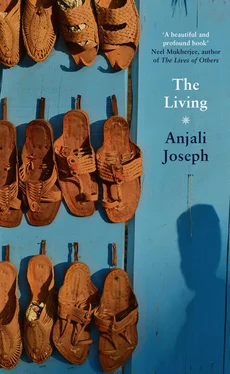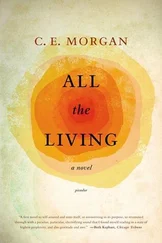The smell. Fertile, green. The stone under my feet is slimy and somehow sad. The steps curve down.
It is the first time in my short life I have been alone. The light at the top becomes whiter and more distant. The smell and the silence, apart from my footsteps and their echo, preoccupy me. What am I? I’ve never considered it. I’ve accepted myself as an adjunct to my brother, an extra set of limbs that at night grow on to his side.
Before I started going down I thought of lies to tell Suresh. There actually is a huge snake at the bottom, with enormous green eyes. There are fish, like in a pond, but much bigger, their mouths splitting the skin of the water. But as I continue to climb down, these ideas leave me. All that remains is the stone, my feet and hands, the steps, and the wall of the well: the light as it disappears in whiteness and reappears below in gleams of blue and grey in the black.
It feels as though I am descending to an emotion as much as a location: as though sadness has collected in the bottom of the well. The water smells bad, not green and dark but just of death. I have the urge to allow myself to fall. Hearing nothing above, I stay still and wait to find out what to do. I think of the monsters I was going to tell Suresh about, and the water’s dark invitation.
I crouch against the wall. My legs hurt, especially my knees. I straighten, slowly, and begin to shake as the blood returns to my feet.
But I’ve started climbing too fast. Halfway, I put my foot where the next step should be, and slip, a slip I have been anticipating. I cry out and cling to the wall. Blood pounds through my ears. I want to scream for my mother.
In a minute or two my breathing becomes normal. I put out my hand to feel for the next step, and carry on climbing. But the moment of fear remains, a terrible event I have had to go through.
Near the top I hear Suresh’s excited voice. He helps to pull me out, and starts to ask questions, but I put out my hand.
Are you sick? Do you feel unwell?
I look at the sky, and the trees with their leaves, think of my parents in our home and how I believed I would never see them again. They wouldn’t find out what happened to me until it was too late. Now I am safe but I know that it is possible for me to experience things they will never know about, and that I will have to keep doing this. I close my eyes.
You’re awake? A tall dark man was looking at me. His shoulders were broad, his face shifty, but there was something nearly noble about him. He stood.
He’s awake! he called towards the kitchen.
What are you doing here? I mumbled. No work?
Sunday.
Oh. But — I started to say.
Anil came in. Your food will be ready soon, he said, important with the message. He smiled. He looks like his mother, this boy. Round-faced. Probably a good thing. I was still trying to think whom my elder son had reminded me of. Someone in my father’s family. Perhaps one of the elder brothers, whom we rarely saw, except at big occasions, a wedding in the village. Or a cousin of my father.
My wife came in. How do you feel? she asked, businesslike. Strange that in this room, she and my grandson were the only people from whom I would have hoped for mercy. Whatever that means.
I don’t know, I managed. Why is everyone here? My daughter-in-law had also come in, carrying shopping in her hand.
You were ill. We had to take you to the hospital. You had a fever. Urinary infection. They had to check it hadn’t spread to your kidneys.
Oh. But I — Oh, I said. I did remember a ward, very noisy, the smell of disinfectant. I’d thought it was a dream.
Dehydration, said my daughter-in-law loudly from the kitchen.
My grandson had an urgent question. Can I watch TV?
All right, I said. Is there a match? He ran to turn it on.
I don’t remember all this, I said to my son. He remained looking at me. He had on a clean kurta, and in effect looked quite handsome, if unlike either of us. Who are these people, who appear in your life and stay in your house, with whom you are forever linked, apparently? How does it happen? It was beyond me. His kindness made me want to weep.
My daughter-in-law came with a plate. I sat up. It was food for invalids: watery doodhi with chana daal; a thin amti, rice, cucumber. Are we all eating this? I wanted to ask. But I began, and it was good. I was soon done, however.
Now your medicine, my wife said. How she appeared in this way, at crucial moments, at the bedside. I swallowed two pills, and lay down again. The batsmen led the players off the field. The cricket commentator was talking in English. Any minute now three or four of them would appear, sitting at a table, in their blazers, with their balding heads, serious men discussing serious things. Anil sat on the floor, rapt, cross-legged, his palms on the ground, gazing up. The television threw a greenish light towards him.
*
The sound was soft and copious, the air fresh.
It shouldn’t be raining now, I said. I sat up a little. I was on the bed, against the wall. The softness of the rain entered the room. I pulled the covers around me. After Ganpati, I said.
It’s probably a final shower, she said. She was on the floor, sorting through our bartans. Some of the older ones, copper, needed re-tinning. And she had opened the cupboard to tidy, and taken down from the shelves the various packages wrapped in cloth or secreted in boxes and tins.
What are you doing? I asked. I meant, Is it necessary to dismantle everything? Can’t you see I’m vulnerable?
Monday, the first day of the week. Out of habit I looked near the door, but there was no pile of hides. There were no finished chappals tied up with cord. Both had been collected last week.
She said, still pulling things out of the cupboard, This is a good chance to do all this. Ordinarily I don’t get time.
Ordinarily meaning, when work is going on, when life is normal. I leaned against the wall. This was the room where I had eaten and slept, so that I could wake up and work. Here I had had sex with my wife, and our children had grown up. None of these things made sense if I wasn’t working. I’d felt chained to work, and to my family, to the unending file of things that had to be done — take in the new hides, cut out the soles, wake my sons, help them to bathe, hurry them inside so their mother could feed them, carry on working, listen to the radio, have tea, talk to the man who came to collect the finished work, stick on the soles, sew on the belts, eat lunch, rest for a few minutes, work in the afternoon darkness as the light moved until it was time again for tea, take a walk at sunset with some errand or other to run, go here, collect this, watch the children outside, beat them if they didn’t study or if they fought and this not with pleasure but efficiently and rarely.
People dropped in. We went to things — weddings, funerals.
I saw our house, that room, in the evening, in the tube light. The boys at different ages, big then small, eating, talking, working, arguing. Their mother always there. I wasn’t in these scenes.
*
Those moments with Ratna were supposed to flare up and die out. But I found myself thinking about her in between. I was cautious. I didn’t want to allow myself too much pleasure. I thought I could try this out for a while, then return to the house, and the old life, my real life, without anyone knowing. No one did know, but the loss I feared crept up on me anyway. It wasn’t that my family would find out. It was that I would be different, so that the same things would no longer satisfy me.
When Ratna’s husband decided that they should move to his brother’s place, somewhere in Karnataka, I wasn’t sad. There was no special farewell, no sentiment. I told myself that if it had gone on for longer than a few months, I would have tired of it, of her. And yet I was shaken. Walking home that day, I realised it was a good thing: once again, I had been delivered of my worries before they could become substantial. Then, suddenly, I burst into tears.
Читать дальше
Конец ознакомительного отрывка
Купить книгу











